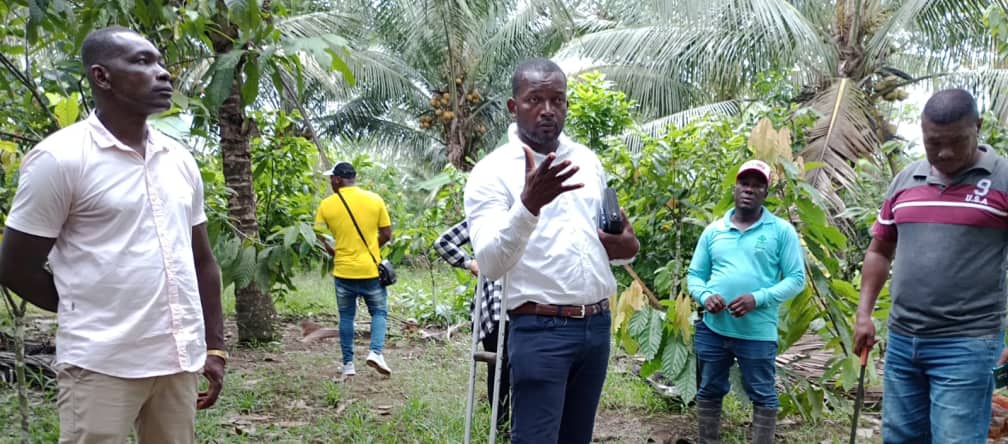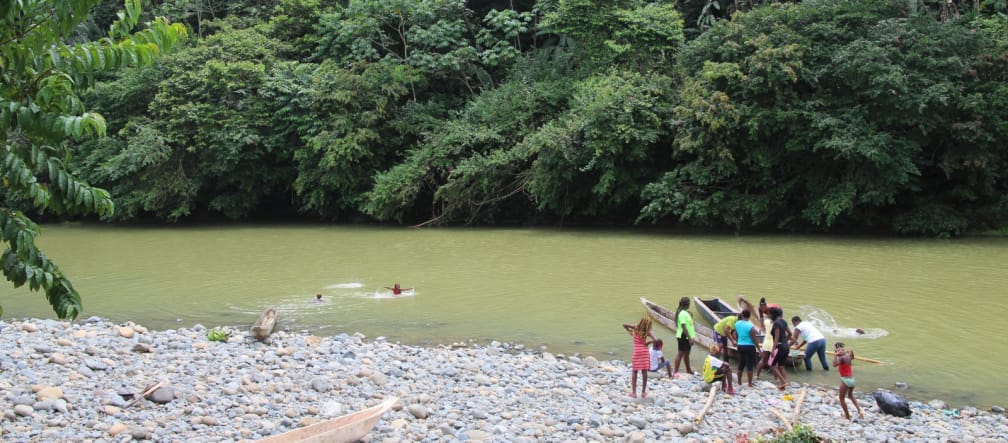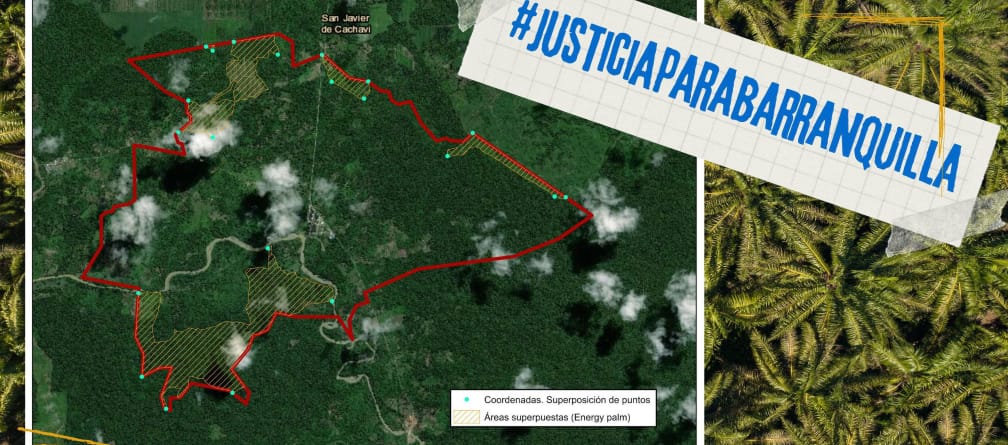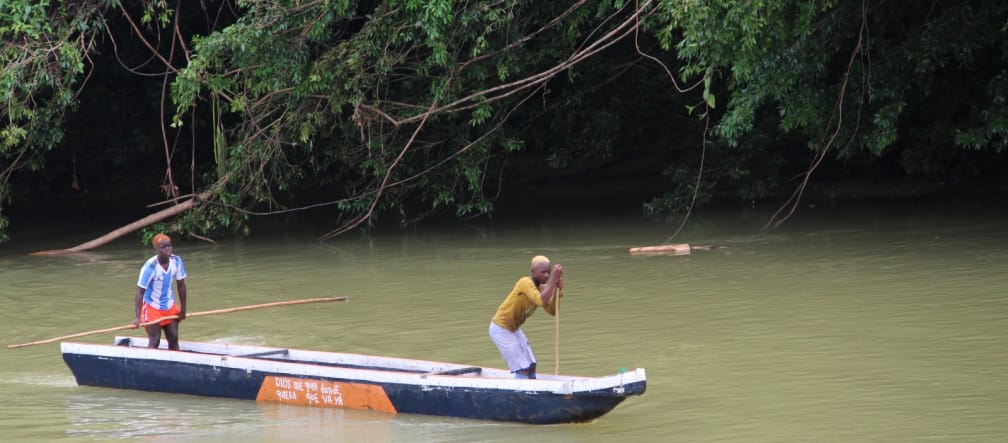Ecuador: Stop land grabbing and racial discrimination for palm oil!
Communities in northern Ecuador are fighting back against land grabbing and deforestation by the palm oil industry. Yet instead of ensuring law and order, the Ecuadorian authorities are siding with the companies – the courts are working to break the resistance of the people by ordering them to pay damages for their protests.
To: the Government of Ecuador, Ministry of Agriculture; cc: Energy & Palma, La Fabril, Nestlé, General Mills and PepsiCo; Roundtable on Sustainable Palm Oil (RSPO)
“Put an end to racism and discrimination: Return the land and respect the rights of the Afro-Ecuadorian community of Barranquilla de San Javier”The last remnants of the Chocó rainforests in Ecuador are located in the province of Esmeraldas on the Pacific Ocean. For generations, the local Indigenous and Afro-Ecuadorian communities have existed in harmony with their surroundings and its rich biodiversity. Yet they live in extreme poverty because the state is hardly present, invests little and does not protect their rights.
Palm oil, timber and gold mining companies are taking advantage of the lack of official presence and oversight by grabbing land, destroying nature and polluting rivers. The authorities generally turn a blind eye to their activities and do not respond to the complaints of the local people.
“The actions of the state and companies are clearly discriminatory,” observes Natalia Bonilla of the organization Acción Ecológica.
Energy & Palma, a palm oil company, has appropriated land of the Afro-Ecuadorian community of Barranquilla de San Javier. According to the Ministry of Agriculture, 251 hectares of the company’s oil palm plantations overlap with the commnunity’s registered collective property.
“The community is being robbed of its land through illegal purchases and sales,” explains lawyer Gustavo Redín, and this despite Barranquilla de San Javier’s constitutional rights over its land.
Following a peaceful protest that was violently broken up by the police, several residents were sued for damages by Energy & Palma. Since then, the dispute has been winding its way through the court system.
“The justice system is being used to intimidate and persecute people,” Redín explains. Even the UN has called on the state to intervene and on palm oil companies and their customers to change their practices.
Energy & Palma belongs to the palm oil company La Fabril, which sells to food multinationals such as General Mills, Nestlé and PepsiCo and is certified as social and sustainable with the RSPO label.
Start of petition: 15/05/2023
Defending ancestral land and rivers
The origins of the Barranquilla de San Javier community and its ancestral land rights date back 500 years, well into the colonial era. Afro-Ecuadorian communities, like the Indigenous peoples of Ecuador, enjoy special rights set out in the constitution. However, the Afro-Ecuadorian community of Barranquilla de San Javier was only officially recognized by the Ministry of Agriculture in Quito by Ministerial Agreement No. 0318 dated December 17, 1997. On June 2, 2000, the community was granted an area of 1,430 hectares as collective common territory by the National Institute for Rural Development.
In the years that followed, the Energy & Palma began to establish oil palm plantations in the area, appropriating land owned by the community despite the special protection the ancestral territories of Indigenous and Afro-Ecuadorian communities enjoy in Ecuador. Among the specially protected collective rights, the 1998 Ecuadorian Constitution and the 2008 Constitution prohibit the sale, partition, alienation and expropriation of the community territories of the Indigenous peoples of Ecuador.
A 2017 multitemporal study of land ownership in the community areas of Barranquilla de San Javier conducted by the Ministry of Agriculture notes that the community’s land, an area of 1,518 hectares, is overlapped by 251 hectares of Energy & Palma oil palm plantations. As a result of the study, the community began to assert its territorial, collective, labor and natural rights claims against the company. Repeated attempts by the community to enter into a dialogue with Energy & Palma about respect for human and territorial rights failed.
A peaceful blockade and protest on one of the access roads to the company’s oil palm plantation ended with a violent eviction by police and a lawsuit filed by the company against seven community members. The company demanded $300,000 in compensation. After a court hearing, the charges against three of them were dropped in the first instance. Four community leaders – Luís Quintero, president of the community, Antonio Mina, Andrés Arce and Néstor Caicedo – were ordered to pay $151,000. They have appealed against this ruling and the proceedings are ongoing.
“The company is twisting the facts and using the situation to abuse the courts,” says Luís Quintero. “We never attacked anyone. We are being sued because we are defending nature. In fact, they should compensate us by reforesting our land and stopping their pollution and logging. But that’s not happening. We are anxious and can hardly feed our children. In the past, it was enough to throw a trap into the river to catch crabs, crayfish and fish. Today there is no point in it. The pollution from oil palm cultivation is increasing. And now they’re demanding money from us. We will continue to fight until justice prevails. The land belongs to us. It is the legacy of our ancestors, and it is up to us to protect it.”
The community of Barranquilla de San Javier filed a protective action in court against Energy & Palma S.A. for violating community property rights by appropriating 251 hectares of land. A protective action may be brought whenever constitutional rights, or rights contained in international human rights instruments, are violated. A court hearing on the matter will be held on June 12.
Serious failures by the Ecuadorian state
In a joint statement dated July 29, 2022, seven United Nations rapporteurs criticized the intimidation and criminalization of the community of Barranquilla de San Javier. They expressed concern that community leaders are not being protected from human rights abuses they are suffering at the hands of the palm oil company. The rapporteurs called on the Ecuadorian state and Energy & Palma, as well as its customers – multinationals such as General Mills, Nestlé and PepsiCo – for information in this regard.
The response of the Ecuadorian state, which has a stake in Energy & Palma, defends the alleged benefits of the palm oil company’s projects and activities in an arbitrary manner and completely without context. Instead of reaching out to the community of Barranquilla or the land secretariat to determine their position and gather the available documentation, the state merely produced the company’s land titles, which are in violation of the law according to the multitemporal study mentioned above.
La Fabril, Energy & Palma and their customers
In July 2022, La Fabril replied with an open letter in which it portrayed itself as a victim. The company claims to have suffered a “threat to the work” of its employees and a “legal violation of its rights to freedom of movement” due to the road blockade that the community carried out in protest. However, the judge dismissed these allegations due to the existence of alternative routes.
For its part, Nestlé responded with a four-page document that states the human rights principles, statements and programs to which the company adheres, as well as the controls and monitoring it carries out, in great detail.
Nestlé writes that it is “aware of the allegations against Energy & Palma” and takes them “very seriously”. It has been “engaging with Grupo La Fabril for a number of years, including on this specific issue”. Nestlé reports that it carried out an evaluation of Energy & Palma’s operations in 2017, which led to the development of an action plan that is monitored annually. The conflict was reportedly acknowledged, and recommendations included the implementation of a mediated dialogue and the creation of a community relations department.
Despite all of the guidelines, best practices and responsible sourcing standards that Nestlé claims to observe, the human rights violations for which Nestlé says it has “no tolerance” are continuing unabated in Barranquilla. It would seem that holding Nestlé’s suppliers to account on “the commitments they have made to find a resolution to the conflict with the Afro-Ecuadorian community of Barranquilla de San Javier” is not enough.
PepsiCo replied with a similar list of human rights mechanisms that the company adheres to or participates in. Furthermore, PepsiCo writes that it “will not tolerate nor contribute to threats, intimidation, or attacks (both physical and legal) against human rights defenders, including those defending labor rights, supporting environmental protection, and exercising their rights and freedoms in peaceful assembly and protest of our business.”
The criminalization of community members is continuing nevertheless, as the human rights policies of Nestlé and PepsiCo only seem to exist on paper.
Please sign our petition in solidarity and to demand justice.
Further information:
- Mongabay 2023. Ecuador: relatores de la ONU se pronuncian sobre intimidación y criminalización contra líderes ambientales: https://es.mongabay.com/2023/05/onu-se-pronuncia-sobre-intimidacion-y-criminalizacion-contra-lideres-ambientales-ecuador/
- Zero Tolerance Initiative 2022. Re: Continúa preocupación por la demanda estratégica contra la participación pública por parte de Energy & Palma: https://es.zerotoleranceinitiative.org/_files/ugd/d6f494_801e797f06b0486b9f704fb70a72e756.pdf
- Mongabay 2020. Ecuador: comuna de Barranquilla insiste en denuncia contra palmicultora por contaminación e invasión de tierras: https://es.mongabay.com/2020/12/palma-en-esmeraldas-ecuador-comunidad-afro-contra-palmicultora/
To: the Government of Ecuador, Ministry of Agriculture; cc: Energy & Palma, La Fabril, Nestlé, General Mills and PepsiCo; Roundtable on Sustainable Palm Oil (RSPO)
Dear Mr. President,
A Joint Communiqué of United Nations Special Rapporteurs (Ref: AL OTH 78/2022) concludes that the palm oil company Energy & Palma, owned by the La Fabril group, abused the Ecuadorian judicial system against people of the Afro-Ecuadorian community of Barranquilla de San Javier, San Lorenzo canton, Esmeraldas province. The United Nations recommends that the Ecuadorian state protect the community defenders Luis Quintero, Antonio Mina, Andrés Arce and Néstor Caicedo and calls on the company to review its conduct.
Like the United Nations, we value the work of these individuals as guardians of nature and defenders of human rights. Defending itself and in the courts and stopping the company’s harassment and expansion is a challenging path for the community to take. Clear forms of racism are apparent in which the inequalities of the justice system are used to stifle their legitimate and peaceful protest.
Under the Ecuadorian Constitution, the ancestral lands granted to the community of Barranquilla de San Javier in 2000 are indivisible, nontransferable and inalienable. We therefore urgently call for the 251 hectares of ancestral land occupied by Energy & Palma – as evidenced by a multitemporal study conducted by the Ministry of Agriculture on September 22, 2017 – to be returned to the community.
The Constitution also guarantees the rights of resistance and collective organization, from which it follows that the state must undertake to protect rights and freedoms so that the people of the community of Barranquilla can defend their territories and forests without legal charges, fines or harassment by companies.
We demand an end to the persecution of the community and that its rights to justice and equality before the law be respected. It must not be discriminated against, silenced or made invisible by the state.
Furthermore, the Ecuadorian Constitution recognizes nature’s right to restoration. The palm oil company must therefore restore the original vegetation (rainforest) on the land it cleared for palm oil production.
For all these reasons, we see an urgent need for a comprehensive policy to guarantee the rights of human rights defenders and environmentalists, including a national action plan on business and human rights to be applied in cases like Barranquilla de San Javier. Ecuador has ratified most of the international human rights instruments of the Universal Declaration of Human Rights and the Inter-American System of Human Rights and must act accordingly.
Yours faithfully,
The issue – rainforest on our dinner tables and in our fuel tanks
At 66 million tons annually, palm oil is the most commonly produced vegetable oil. Its low world market price and properties that lend themselves to processed foods have led the food industry to use it in half of all supermarket products. Palm oil can be found in frozen pizzas, biscuits and margarine, as well as body creams, soaps, makeup, candles and detergents.
Few people realize that almost half of the palm oil imported into the EU is used as biofuel. Since 2009, the mandatory blending of biofuels into motor vehicle fuels has been a major cause of deforestation.
Oil palm plantations currently cover more than 27 million hectares of the Earth’s surface. Forests and human settlements have been destroyed and replaced by “green deserts” containing virtually no biodiversity on an area the size of New Zealand.
The impact – suffering and death in producer countries, climate havoc
The warm, humid climate of the tropics offers perfect growth conditions for oil palms. Day after day, huge tracts of rainforest in Southeast Asia, Latin America and Africa are being bulldozed or torched to make room for more plantations, releasing vast amounts of carbon into the atmosphere. As a consequence, Indonesia – the world’s largest producer of palm oil – temporarily surpassed the United States in terms of greenhouse gas emissions in 2015. With their CO2 and methane emissions, palm oil-based biofuels actually have three times the climate impact of traditional fossil fuels.
Palm oil is not only bad for the climate: As their forest habitat is cleared, endangered species such as the orangutan, Borneo elephant and Sumatran tiger are being pushed closer to extinction. Smallholders and indigenous people who have inhabited and protected the forest for generations are often brutally driven from their land. In Indonesia, more than 700 land conflicts are related to the palm oil industry. Human rights violations are everyday occurrences, even on supposedly “sustainable” and “organic” plantations.
As consumers, we are largely unaware of these broader issues, yet our daily palm oil consumption also impacts our health: refined palm oil contains large amounts of harmful fatty acid esters that are known to damage DNA and cause cancer.
The solution – a revolution on our dinner tables and in our fuel tanks
Only 70,000 orangutans still roam the forests of Southeast Asia, yet the EU’s biofuels policy is pushing them to the brink of extinction. Every new plantation on Borneo is destroying a further piece of their habitat. Stepping up the pressure on policymakers is a must if we want to save our tree-dwelling kin. Apart from that, however, there is still a lot we can do in day-to-day life.
Follow these simple tips to recognize, avoid and combat palm oil:
- Enjoy a home-cooked meal: Use your imagination: why not try almond-coconut-pear biscuits? Or pizza with potato and rosemary? A meal cooked from fresh ingredients beats processed foods containing palm oil every time. Oils such as sunflower, olive, rapeseed or flaxseed are ideal for cooking and baking.
- Read labels: As of December 2014, labeling regulations in the EU require food products to clearly indicate that they contain palm oil. However, in the case of non-food items such as cosmetics and cleaning products, a wide range of chemical names may still be used to hide the use of palm oil. A quick check of your favorite search engine will turn up palm oil-free alternatives, however.
- Remember that the customer is king: Ask your retailers for palm oil-free products. Write product manufacturers and ask them why they aren’t using domestic oils. Companies can be quite sensitive to issues that give their products a bad name, so inquiring with sales staff and contacting manufacturers can make a real difference. Public pressure and increased awareness of the problem have already prompted some producers to stop using palm oil.
- Sign petitions and write your elected representatives: Online campaigns put pressure on policymakers responsible for biofuels and palm oil imports. Have you already signed all of Rainforest Rescue’s petitions?
- Speak out: Protest marches and creative action on the street raise public and media awareness of the issue, which in turn steps up the pressure on policymakers.
- Leave your car at home: Whenever you can, walk, ride a bicycle or use public transport.
- Be informed and inform others: Big Business and governments would like us to believe that biofuels are good for the climate and that oil palm plantations are sustainable. Spread the word – share this information with your family and friends and encourage them to rethink their consumption habits. It’s in our hands!
Multitemporal Study of Land Tenure in Municipal Territories of the Province of Esmeraldas, technical-legal report dated September 22, 2017, carried out by the General Secretariat of the Ministry of Agriculture, Livestock, Aquaculture and Fisheries.
Officially recognized by the Ecuadorian State since June 28, 2000, under Register No. 070 of the Property Registry of the Canton of San Lorenzo and under No. 01 of the Repertorio Book, Page No. 038, an allotment of land with an area of 1430.80 hectares granted by the National Institute for Agricultural Development (INDA) was registered with the Fourth Public Notary of the Canton of Esmeraldas in the name of the Afro-Ecuadorian community of Baranquilla de San Javier.
According to the Ecuadorian Constitution of 2008, the ancestral territory of Indigenous and Afro-Ecuadorian communities is indivisible, irrevocable and non-transferable.
Mongabay 2023. Ecuador: relatores de la ONU se pronuncian sobre intimidación y criminalización contra líderes ambientales: https://es.mongabay.com/2023/05/onu-se-pronuncia-sobre-intimidacion-y-criminalizacion-contra-lideres-ambientales-ecuador/
OHCHR Palais des Nations (UN) 2022. Ref.: AL OTH 80/2022: https://spcommreports.ohchr.org/TMResultsBase/DownLoadPublicCommunicationFile?gId=27475
General Mills (2022). Statement on responsible palm oil sourcing: https://www.generalmills.com/how-we-make-it/healthier-planet/sustainable-and-responsible-sourcing/palm-oil
Nestle (2021). Supply Chain Disclosure Palm Oil: https://web.archive.org/web/20230121162526/https://www.nestle.com/sites/default/files/2019-08/supply-chain-disclosure-palm-oil.pdf
PepsiCo (2022). PepsiCo Palm Oil Mill List 2021: https://www.pepsico.com/docs/default-source/sustainability-and-esg-topics/pepsico-palm-oil-mill-list-2021.pdf?sfvrsn=6d6ac16d_3
-
The Roundtable on Sustainable Palm Oil (RSPO), based in Kuala Lumpur, awards a global seal for palm oil that has been produced in what the organization deems as a sustainable and socially responsible manner. La Fabril states that it has been RSPO-certified by the Brazilian company IBD since 2018.
See: La Fabril 2018. GRUPO LA FABRIL RECEIVES INTERNATIONAL CERTIFICATION FOR ITS SUSTAINABLE PRODUCTION OF PALM OIL: https://www.lafabril.com.ec/en/grupo-la-fabril-receives-international-certification-for-its-sustainable-production-of-palm-oil/press-room/
On June 2, 2000, the Afro-Ecuadorian community of Barranquilla de San Javier obtained a collective land title through Judgment No. 0006E00371, without mortgage, issued by the National Institute for Agricultural Development, on a parcel of land with an area of 1,430.8 hectares in the municipality of San Javier de Cachavi, canton of San Lorenzo, province of Esmeraldas. On June 27, 2000, the property was notarized before the Fourth Notary Public’s Office of Ms. Vicenta Villacres Torres and subsequently recorded on June 28, 2000, in the land registry of the canton of San Lorenzo under Directory No. 01, Register No. 070 Page No. 038
ESTUDIO MULTITEMPORAL DE TENENCIA DE LA TIERRA EN TERRITORIOS COMUNALES DE LA PROVINCIA DE ESMERALDAS, del Informe Técnico – Jurídico realizado el 22 de septiembre del 2017 en Esmeraldas, por la Dirección de Secretaría General del Ministerio de Agricultura. Ganadería. Acuacultura y Pesca
fn-lhucba3a
Republic of Ecuador, Ministry of Foreign Relations 2022. Note Nr. 4-7-225/2022: https://spcommreports.ohchr.org/TMResultsBase/DownLoadFile?gId=37216
La Fabril 2022. Carta abierta y Plan de Acción de La Fabril, sobre apertura a diálogos participativos y abiertos con comunidades del área de influencia y su cadena de abastecimiento: https://www.lafabril.com.ec/carta-abierta-de-la-fabril-sobre-apertura-a-dialogos-participativos-y-abiertos-con-comunidades-del-area-de-influencia-y-de-su-cadena-de-abastecimiento/responsabilidad-social/
Nestlé 2022. Ref.: AL OTH 81/2022: https://spcommreports.ohchr.org/TMResultsBase/DownLoadFile?gId=37139
Pepsico 2022. Re Joint Communication from Special Procedures: https://spcommreports.ohchr.org/TMResultsBase/DownLoadFile?gId=37126



